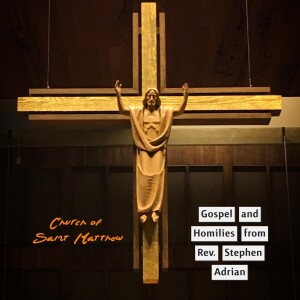
Wednesday Apr 19, 2023
09.27.2020 Homily
The gospel passage today begins with Jesus telling a story about a father who asked his sons to go to work, go into the vineyard today, work. One said “Yes,” and didn't go. And one said “No” and did go. You see, to be a disciple of Jesus is not a spectator sport. We're not here just to watch Jesus, or just to be impressed by Jesus, or even to be overwhelmed by the works of Jesus.
That's not what discipleship is all about. Discipleship is about work. It's about work in the vineyard of the kingdom of God. And that's what you and I are challenged to do, to bring our talents--the gifts we have--to proclaim that gospel, not so much by the words we speak, but by the deeds we do, the way we live our daily lives.
We live in a time where there are so many challenges--challenges of nature, challenges of illness, challenges of society. And it seems to be almost overwhelming. And it's very easy to say, “Well there's nothing I can really do about that. That's just too big for me. You certainly can't expect me to do something about all of this.”
And what Jesus is saying to us is, yes, I do expect you to do something about it. But you've got to remember, you can't do it all, but you can do something. And the way you live your daily lives, you can, in some ways, proclaim the truth of the kingdom of God, the mercy of God, the justice of God, the goodness of God, the reconciliation that God brings. That's the work we're meant to do. We're meant to be proclaimers of the good news. And sometimes we are enthusiastic about it, and then the enthusiasm falls apart. And other times we are lackadaisical about it, and then we have second thoughts and we bring ourselves to do it.
I think the message of the gospel is whether you start early or you start late, whether you say yes and then no, or no and then yes, that's really not what's important. What's important is ultimately that you and I are called to get to work.
Well as we pray today, we bring before the Lord, all the concerns that touch our lives and the life of the world we live in. And we ask for the Lord to heal, to strengthen, to transform. But we don't do that as spectators. We don't do that as merely standing and watching what He's going to do. Because when we ask, He expects us to be part of the answer.
One of the great saints of the United States, Katharine Drexel, had a particular passion for the education of people of color. And this was at the end of the 1800s. And she and her family visited the city of Rome and they had the opportunity to have a meeting with Pope Leo XIII. And in the course of that meeting, Catherine said to him, "We have a huge problem in the United States. We have a problem about African-American people and about Native people who are receiving no education. They are not regarded as fully human. You need to do something about that. You need to send missionaries."
And Leo looked at her and said, "You're right, so why don't you do it?" And that's what she did. She established a community that brought about the education of African-American young people and of Native people. The largest, most prestigious college that serves principally the African-American community was established by her.
Leo looked at her and said, "You're right. You do it." Jesus says to each one of us, "Now you do it."
No comments yet. Be the first to say something!